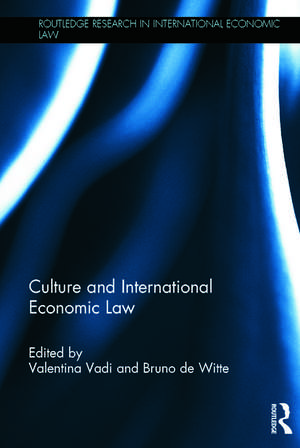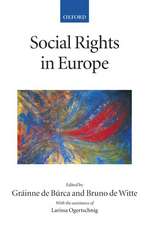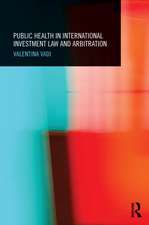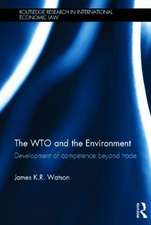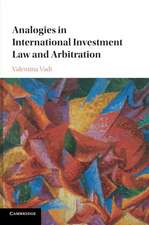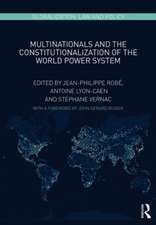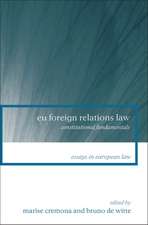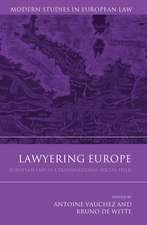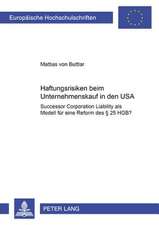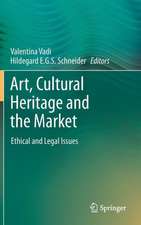Culture and International Economic Law: Routledge Research in International Economic Law
Editat de Valentina Vadi, Bruno de Witteen Limba Engleză Hardback – 5 feb 2015
This book explores the ‘clash of cultures’ between international law and international cultural law, and asks whether States can promote economic development without infringing their cultural wealth. The book contains original chapters by experts in the field. Key issues include how international courts and tribunals are adjudicating culture–related cases; the interplay between indigenous peoples' rights and economic globalization; and the relationships between culture, human rights, and economic activities.
The book will be of great interest and use to researchers and students of international trade law, cultural heritage law, and public international law.
| Toate formatele și edițiile | Preț | Express |
|---|---|---|
| Paperback (1) | 467.44 lei 6-8 săpt. | |
| Taylor & Francis – 7 noi 2016 | 467.44 lei 6-8 săpt. | |
| Hardback (1) | 1057.09 lei 6-8 săpt. | |
| Taylor & Francis – 5 feb 2015 | 1057.09 lei 6-8 săpt. |
Din seria Routledge Research in International Economic Law
-
 Preț: 278.61 lei
Preț: 278.61 lei -
 Preț: 355.32 lei
Preț: 355.32 lei -
 Preț: 343.00 lei
Preț: 343.00 lei -
 Preț: 309.79 lei
Preț: 309.79 lei -
 Preț: 410.07 lei
Preț: 410.07 lei -
 Preț: 389.38 lei
Preț: 389.38 lei - 18%
 Preț: 272.50 lei
Preț: 272.50 lei - 12%
 Preț: 313.61 lei
Preț: 313.61 lei - 18%
 Preț: 1010.26 lei
Preț: 1010.26 lei - 14%
 Preț: 337.84 lei
Preț: 337.84 lei -
 Preț: 469.38 lei
Preț: 469.38 lei -
 Preț: 388.72 lei
Preț: 388.72 lei -
 Preț: 416.05 lei
Preț: 416.05 lei - 18%
 Preț: 1000.27 lei
Preț: 1000.27 lei - 13%
 Preț: 297.15 lei
Preț: 297.15 lei -
 Preț: 467.44 lei
Preț: 467.44 lei -
 Preț: 416.22 lei
Preț: 416.22 lei -
 Preț: 487.62 lei
Preț: 487.62 lei -
 Preț: 286.43 lei
Preț: 286.43 lei - 17%
 Preț: 259.98 lei
Preț: 259.98 lei - 31%
 Preț: 763.97 lei
Preț: 763.97 lei - 18%
 Preț: 1057.89 lei
Preț: 1057.89 lei - 18%
 Preț: 840.56 lei
Preț: 840.56 lei -
 Preț: 476.08 lei
Preț: 476.08 lei - 18%
 Preț: 1001.07 lei
Preț: 1001.07 lei -
 Preț: 453.88 lei
Preț: 453.88 lei - 9%
 Preț: 1005.14 lei
Preț: 1005.14 lei - 25%
 Preț: 545.58 lei
Preț: 545.58 lei -
 Preț: 412.95 lei
Preț: 412.95 lei - 18%
 Preț: 1000.27 lei
Preț: 1000.27 lei - 18%
 Preț: 1060.52 lei
Preț: 1060.52 lei - 18%
 Preț: 1061.69 lei
Preț: 1061.69 lei
Preț: 1057.09 lei
Preț vechi: 1289.13 lei
-18% Nou
Puncte Express: 1586
Preț estimativ în valută:
202.30€ • 219.67$ • 169.93£
202.30€ • 219.67$ • 169.93£
Carte tipărită la comandă
Livrare economică 22 aprilie-06 mai
Preluare comenzi: 021 569.72.76
Specificații
ISBN-13: 9780415723268
ISBN-10: 0415723264
Pagini: 270
Dimensiuni: 156 x 234 x 23 mm
Greutate: 0.52 kg
Ediția:1
Editura: Taylor & Francis
Colecția Routledge
Seria Routledge Research in International Economic Law
Locul publicării:Oxford, United Kingdom
ISBN-10: 0415723264
Pagini: 270
Dimensiuni: 156 x 234 x 23 mm
Greutate: 0.52 kg
Ediția:1
Editura: Taylor & Francis
Colecția Routledge
Seria Routledge Research in International Economic Law
Locul publicării:Oxford, United Kingdom
Public țintă
PostgraduateCuprins
1. Introducing Culture and International Economic Law, Bruno de Witte and Valentina Vadi Part 1: The Cultural Life of International Law 2. Culture, Human Rights and International Law, Francesco Francioni 3. The Cultural Dimension of Economic Activities in International Human Rights Jurisprudence, Yvonne Donders Part 2: The Cultural Life of International Economic Law 4. Cultural Heritage in International Economic Law, Valentina Vadi 5. Investment Projects Affecting Indigenous Heritage, Federico Lenzerini 6. What's in Name? The Contested Meaning of Free, Priort and Informed Consent in International Financial Law and Indigenous Rights, Sarah Sargent 7. The Trade v. Culture Discourse: Tracing its Evolution in Global Law, Mira Burri Nenova 8. International Exchange and Trade in Cultural Objects, Ana Vrdoljak Part 3: The Cultural Life of Intellectual Property Law 9. Traditional Knowledge: Cultural Heritage or Intellectual Property?, Antonietta Di Blase 10. Propertization, Safegaurding and the Cultural Commons: The Turf Wars of Intangible Cultural Heritage and Traditional Cultural Expressions, Lucas Linxinski and Louise Buckingham 11. Copyright and the Digitization of Cultural Heritage on the EU Digital Agenda, Lucky Belder Part 4: The Cultural Life of European Law 12. Market Integration and Cultural Diversity in EU Law, Bruno De Witte 13. EU Media Law: Cultural Policy or Business as Usual?, Rachel Craufurd Smith 14. Culture in the EU's External Economic Relations, Evangelia Psychogiopoulou
Descriere
Has an international economic culture emerged that emphasizes productivity and economic development at the expense of the common wealth? This book explores the ‘clash of cultures’ between international law and international cultural law, and asks whether States can promote economic development without infringing their cultural wealth. The book contains original chapters by experts in the field. Key issues include how international courts and tribunals are adjudicating culture–related cases; the interplay between indigenous peoples' rights and economic globalization; and the relationships between culture, human rights, and economic activities.
